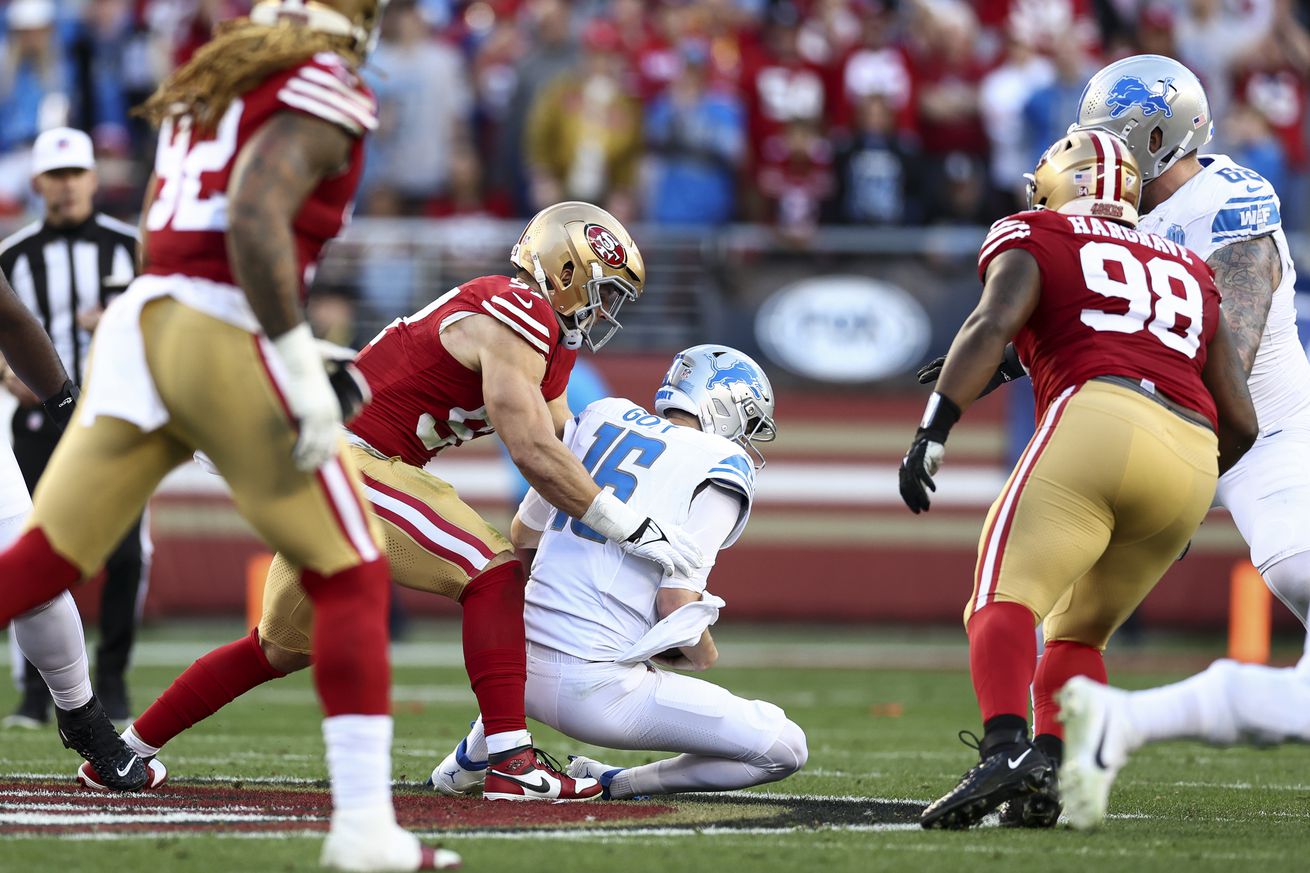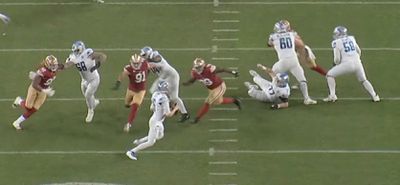
Looking back at the two fourth-down stops by the defense in the NFC Championship.
The San Francisco 49ers played closer to their D+ game than B+ game, at least during the first half of the NFC Championship against the Detroit Lions. Detroit converted 50 percent of their third downs, averaged over six yards per play, and had 442 yards of offense.
Total yards is a lazy way to judge a defense’s performance. Offenses are too good to keep in check in today’s NFL. The 49ers went up against the best non-Shanahan tree offensive mind in the sport. Offensive coordinator Ben Johnson put on a clinic. There’s a reason he’s been one of the leading head coaching candidates these past two hiring cycles.
The 49ers defense relied on turnovers and stops at the most critical times for the second time in as many weeks. Running back Jahmyr Gibbs picked the worst time to cough up the ball. Gibbs had fumbled twice during the last month of the season, so this wasn’t abnormal.
But Sunday’s game was decided by a pair of fourth-down stops.
A Gamblin’ Dan
Head coach Dan Campbell has received an unhealthy amount of criticism for going for it twice on fourth down. The logic was since the Lions were up 14, they could’ve made it a three-possession game by kicking a field goal.
Did we forget who Campbell was all season? He was never kicking a field goal in either situation, regardless of the score being tied or if he was up 40. During the regular season, the Lions went for it 21 times in opponents’ territory when it was 4th & 3 or less. They converted 18 of those. It’s who they are.
Detroit did not gain a yard on both first-down tries. You can’t ignore that when talking about their failed fourth-down conversions. You have four downs to gain ten yards, not one.
The broadcast pointed out how seldom defensive coordinator Steve Wilks ran man coverage during the game. Well, he did on first down. It forced Jared Goff to make a tight-window throw down the field to tight end Sam LaPorta. He had a step on Dre Greenlaw, but the throw would’ve needed to be perfect, and it wasn’t.
Forcing an incompletion when you’re not sitting back and playing soft, zone coverage. Weird! Greenlaw doesn’t have to think when he’s playing man coverage. He doesn’t have to worry about looking in the backfield, the other receiving threats, or anything else. He can focus on one thing and rely on his athleticism.
On the next play, in zone, LaPorta caught an underneath throw against Greenlaw for a gain of six yards. That set up 3rd & 4 from the 49ers 36-yard line.
The Lions’ speed had been an issue for the 49ers to match. Gibbs and Jameson Williams recorded the first and sixth-fastest times of the weekend with the ball in their hands, per Next Gen Stats.
Instead of giving one of those two the ball or throwing to Amon-Ra St. Brown, Detroit handed it off to St. Brown. It was backup against backup along the line of scrimmage. But San Francisco’s second-stringer is a former top-15 pick in 2020, while the Lions’ relied on an undrafted free agent in 2021.
The difference between 4th & 1 and 4th & 2 to 3 is the Lions running the ball with David Montgomery or going shotgun with Goff.
Javon Kinlaw has been a force in two playoff games in limited playing time. There isn’t a defensive tackle in the postseason who has more tackles than Kinlaw. He’s also second in Pro Football Focus’s “win percentage” stat for pass rushers at his position.
Johnson had a perfect play call on fourth down and got the exact look he had hoped. In short-yardage situations, the worst thing you can do is run a route at the yard to gain. Defenses are sitting at the first down marker, anticipating short throws.
Wide receiver Josh Reynolds ran a nine-yard route.
Nick Bosa got an incredible jump off the ball — he was one of the quickest players off the ball all season — and spooked Jared Goff enough to move off his spot. That forced Goff to miss just wide enough, and Reynolds failed to adjust, resulting in a drop.
Down 14 with their season on the line, the 49ers won three out of four downs against the team that had scored on five of its previous possessions. This unit is talented enough to flip the switch and control the game. But lazy pursuit and sloppy tackling have done them in during the postseason — outside of the penalties.
On the ensuing fourth down drive, Johnson bailed the Niners out on first down the same way Kyle Shanahan bailed out the Lions by calling a reverse to Deebo. When your offense is rolling, there’s no need for trick plays. Detroit gained 22 and 16 yards on their first two plays.
Then they ran a flea flicker. Then, on 2nd & 10, Goff airmailed a pass to Gibbs — with Greenlaw defending in man(!) coverage — with Chase Young bull-rushing the offensive tackle into Goff’s lap as an assist. A third-down blitz forced Goff to throw before he wanted to and short of the sticks.
That brings us to 4th & 3. Detroit broke the huddle with an empty formation. Here’s a look at what Goff was staring at 1.9 seconds into his dropback:

Dan Campbell wasn’t planning on three defensive linemen winning when he decided to go for it on fourth down. Ben Johnson double-teamed Nick Bosa and even chipped him with a running back. The one player who you couldn’t let win (again) on fourth down was Bosa.
This is why the 49ers invested in an interior rusher this offseason. Arik Armstead was already among the NFL’s most productive interior defensive linemen. Javon Hargrave saved the day a week ago on third down when the 49ers needed him the most, and he does so again here.
We’ve seen the defense rise to the occasion in the second half two weeks in a row. After the game, Bosa told Josina Anderson that he felt their defense was playing their best ball. If this was the game that the 49ers flipped on the switch, they’d need to leave it on for four quarters against the Kansas City Chiefs.